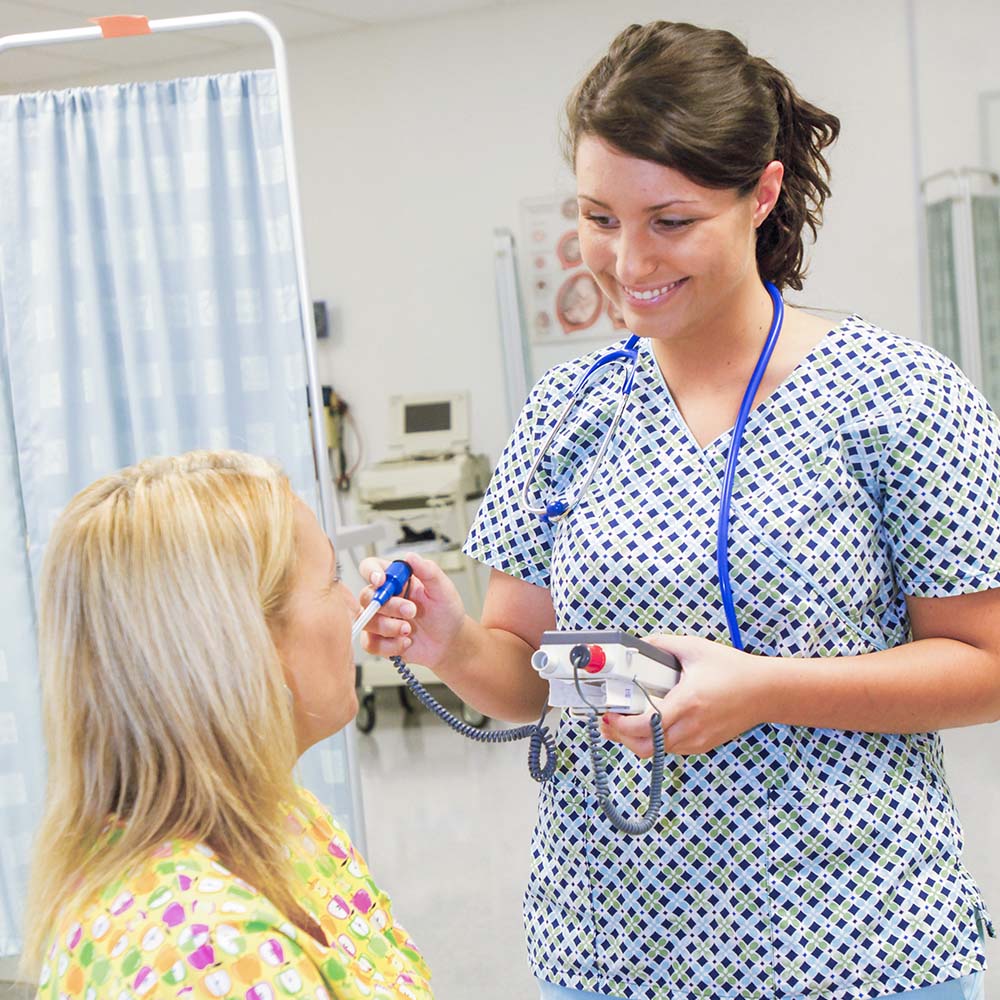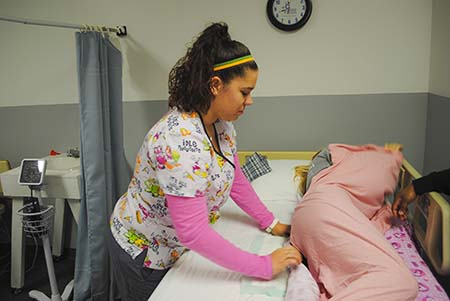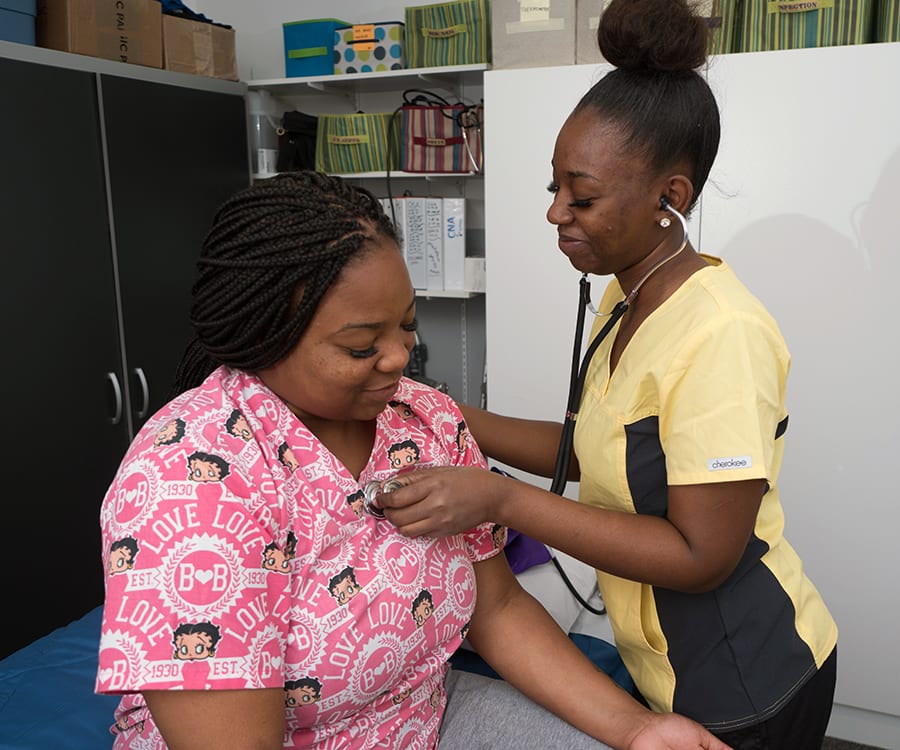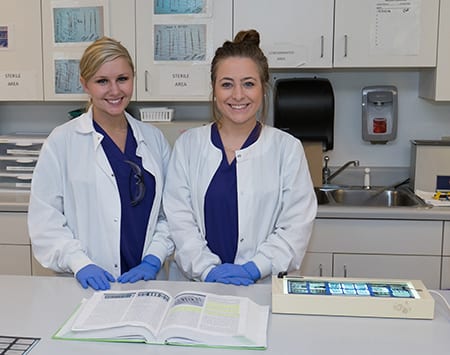Are you considering becoming a Certified Nursing Assistant (CNA)? Are you curious about the CNA responsibilities, class topics, and training time?
A Certified Nursing Assistant is someone who provides basic care and help with activities of daily living. They also clean and bathe patients or residents.
A Certified Nursing Assistant Training Program offers classes to teach nursing assistant duties and prepare the student for the Certified Nursing Assistant (CNA) certification exam that is necessary to become a CNA in the state of Illinois.
Overview of Certified Nursing Assistant Training
At Midwest Technical Institute (MTI), the Nursing Assistant Training Program is designed to prepare qualified individuals to be safe, caring, and effective nursing assistants who work under the supervision of qualified health care professionals. These classes present basic nursing assistant principles and provide opportunities for practice and demonstration of skills related to patient care. CNAs are trained to hold entry-level positions typically available in hospitals, nursing homes, and home health agencies. Students’ time will be divided between classroom instructions, laboratory time, and supervised experience in nursing home and/or hospital settings.
What Classes Do You Take During CNA Training?
During CNA training at MTI, we prepare you to take the State of Illinois certification exam. Upon meeting graduation requirements of the program, you will earn a Basic Nursing Assistant certificate. Classes include the following:
Introduction to Health Care Systems
This class defines long-term care centers and their personnel, and Omnibus Budget Reconciliation Act (OBRA) regulations and requirements. Plus, it covers delegated tasks, resident rights, professionalism, ethical behavior on a job, qualities and traits of a successful nursing assistant, philosophy of patient care, and communicating with a professional healthcare team.
The Patient
This part of the course reviews the basic structures and functions of cells and tissues, as well as each of the body’s systems. You’ll learn about the importance of quality of life for older patients, and you’ll discuss aspects of their lives, including social relationships, aging, death, retirement, and housing issues. You’ll also explore the importance of sexuality throughout life and how aging affects it.
Protecting the Person
This module discusses the safety of older persons, risk factors, common safety measures, prevention of accidents and restraint use. You will learn about the different types of infection, signs and symptoms of infection, asepsis, disinfection and sterilization, as well as blood-borne pathogen standards. Also included are best practices in, lifting, turning and moving persons comfortably.
Assisting with Activities of Daily Living
In this course, you will learn essential skills such as proper bed making, personal hygiene and grooming, positioning techniques and how to assist with urinary and bowel elimination.
The training also covers how to maintain a safe, clean resident environment and support nutrition and hydration needs which are key factors in promoting overall health and well-being.
Beyond technical skills, you will learn how to care with compassion and to recognize physical and emotional changes in patients, communicate respectfully and support both residents and their families during vulnerable moments.
Patient Assessment
You’ll learn about the importance of exercise and activity for older adults, along with how to ensure their comfort, rest, and sleep. The course will also cover the needs of geriatric patients who require oxygen and how to assist those with limited abilities. You’ll practice measuring vital signs like blood pressure, temperature, pulse, and respiration. Additionally, you’ll learn how to assist with a physical examination while staying within the scope of a Basic Nursing Assistant’s (BNA) role.
Assisting with Care Needs
In this class, you’ll learn how to transfer, admit, and discharge patients. The course also covers wound care and how to apply heat and cold treatments. You’ll be introduced to common physical and mental health problems, including topics on dementia, confusion, and developmental disabilities. Throughout the class, you’ll discuss rehabilitation, restorative care, basic emergency procedures, and care for the dying.
Nursing Assistant Practicum
Over the course of 40 clock hours, you’ll participate in an unpaid practicum setting where attendance is crucial. You will be responsible for getting to and from your externships where you will apply the knowledge learned throughout the CNA Training Program including hands-on caring for residents in various long-term care facilities.
Interested in Learning More About Allied Health?
Fill out the form below to receive info about our career training programs.
Start Your Journey as a CNA
Get started on your path toward becoming a CNA at Midwest Technical Institute! Get hands-on training from experienced instructors and complete your CNA training in just 7 weeks.
MTI’s Nursing Assistant Training Program is available at three campus locations in Illinois, including Springfield, East Peoria, and Moline. Schedule a tour of your local campus or contact MTI’s Admissions Team to get started today!
SOURCES



